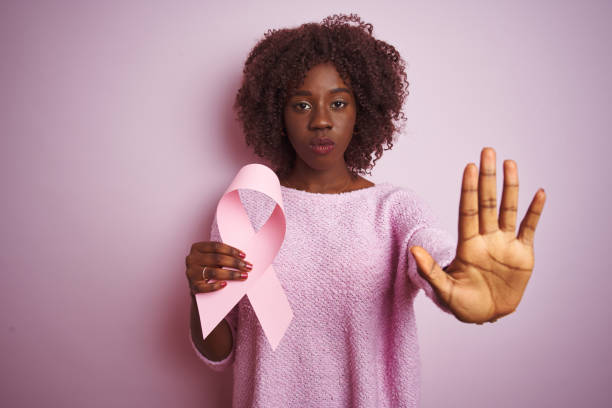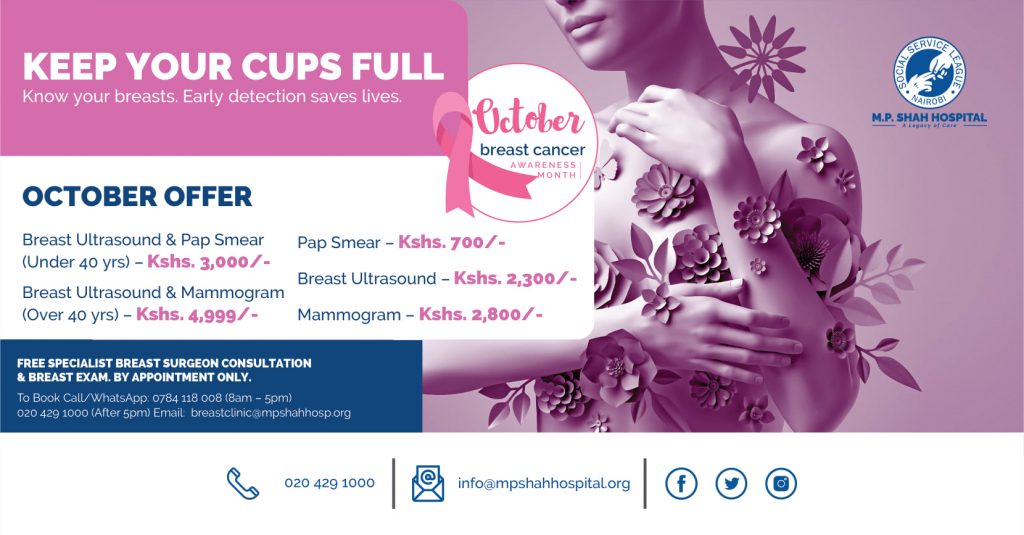What You Need To Know About Breast Cancer
Breast cancer is a life threatening disease which accounts for the largest number of cancer deaths among women globally.
According to a post published by ASCOT the American Society of Clinical Oncology, breast cancer is the most diagnosed cancer with an annual incidence of 6,000 new cases and 2,500 cancer related deaths in Kenya.
Regular mammogram and a clinical breast exam performed at annual check-ups, breast self-examination plays an important role in early detection.
Here is what you need to know about breast cancer.
What is breast cancer?
Breast cancer is a disease in which cells in the breast grow out of control. There are different kinds of breast cancer. The kind of breast cancer depends on which cells in the breast turn into cancer.
Who can get it?
The two most significant risk factors are being a woman, and increasing age. However, there are other factors that may increase your risk, and some that may lower it.
Early signs of breast cancer?
The most common symptom of breast cancer is a new lump or mass. A painless, hard mass that has irregular edges is more likely to be cancer, but breast cancers can be tender, soft, or round. They can even be painful. For this reason, it’s important to have any new breast mass, lump, or breast change checked by an experienced health care professional.
Other possible symptoms of breast cancer include:
- Swelling of all or part of a breast (even if no lump is felt)
- Skin dimpling (sometimes looking like an orange peel)
- Breast or nipple pain
- Nipple retraction (turning inward)
- Nipple or breast skin that is red, dry, flaking or thickened
- Nipple discharge (other than breast milk)
Swollen lymph nodes (Sometimes a breast cancer can spread to lymph nodes under the arm or around the collar bone and cause a lump or swelling there, even before the original tumor in the breast is large enough to be felt.)
Although any of these symptoms can be caused by things other than breast cancer, if you have them, they should be reported to a health care professional so the cause can be found.
What are the risks factors of getting breast cancer?
- Not being physically active. Women who are not physically active have a higher risk of getting breast cancer.
- Being overweight or obese after menopause.
- Drinking alcohol & smoking.
- Family History
- Exposure to chemicals
What are the ways to reduce your risk of getting breast cancer?
- Get to and stay at a healthy weight.
- Be physically active and avoid time spent sitting.
- Follow a healthy eating pattern.
- It is best not to drink alcohol.
Types of cancer treatments.
The most common treatments are surgery, chemotherapy, and radiation. Other options include targeted therapy, immunotherapy, laser, hormonal therapy, and others.
What is M.P. Shah Hospital doing about it?
The M. P. Shah Hospital has a One-Stop Breast Clinic committed to helping women and men address all issues concerning the breast.
The one stop breast clinics are run at Village Market Medical Centre and the Main Hospital in Parklands.
M.P Shah Hospital has various Diagnosis & Treatment including:
- Diagnosis and management of all aspects of breast and skin problems
- Benign breast lumps, breast pain, nipple discharge, family history
- Breast cancer treatment: oncoplastic surgery, immediate and delayed reconstruction
- Breast implant exchange, augmentation, reductions and lipomodelling for correction of breast deformities and/or breast asymmetry for patients having undergone breast cancer surgery in the past
- Treatment of male breast enlargement (Gynaecomastia)
*****
Clinic Schedule:
Main Hospital Doctors Plaza (Waridi Centre)
Monday and Wednesday 8:00am – 5:00pm
Village Medical Centre
Thursday and Friday 8:00am – 5:00pm
To book an appointment call: 0204291327/500/100
Or email : breastclinic@mpshahhosp.org



